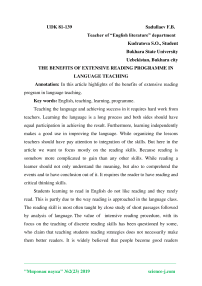The benefits of extensive reading programme in language teaching
Автор: Sadullaev F.B., Kudratova S.O.
Журнал: Мировая наука @science-j
Рубрика: Основной раздел
Статья в выпуске: 2 (23), 2019 года.
Бесплатный доступ
In this article highlights of the benefits of extensive reading program in language teaching.
English, teaching, learning, programme
Короткий адрес: https://sciup.org/140264260
IDR: 140264260 | УДК: 81-139
Текст научной статьи The benefits of extensive reading programme in language teaching
Teaching the language and achieving success in it requires hard work from teachers. Learning the language is a long process and both sides should have equal participation in achieving the result. Furthermore, learning independently makes a good use in improving the language. While organizing the lessons teachers should have pay attention to integration of the skills. But here in the article we want to focus mostly on the reading skills. Because reading is somehow more complicated to gain than any other skills. While reading a learner should not only understand the meaning, but also to comprehend the events and to have conclusion out of it. It requires the reader to have reading and critical thinking skills.
Students learning to read in English do not like reading and they rarely read. This is partly due to the way reading is approached in the language class. The reading skill is most often taught by close study of short passages followed by analysis of language. The value of intensive reading procedure, with its focus on the teaching of discrete reading skills has been questioned by some, who claim that teaching students reading strategies does not necessarily make them better readers. It is widely believed that people become good readers through reading, and that learning how to read should mean a focus of attention on the meaning rather than the language of the text.
Another model for teaching reading exists. This is an “extensive reading approach” and involves students reading long texts or large quantities for general understanding, with the intention of enjoying the texts. Students are allowed to choose the books they read depending on their interests, and there is not always a follow-up discussion or work in class. In this way students are encouraged to read for pleasure and should become better readers. The principal objective of undertaking an extensive reading approach is to get students reading in English and liking it. An increase in reading fluency should be another objective. Because of this, reading should be a pleasurable activity for the student, promoted as much as possible by the teacher. Reading for pleasure requires a large selection of books be available for students to choose from at their level. Here, teachers can make good use of graded readers (books which have been written specifically for EFL/ESL students or which have been adapted from authentic texts). Setting up a class library is a good way to provide material for students, and because the books are kept in the actual classroom, there is a greater chance that they will be borrowed, and teachers also have more opportunities to refer to them during class. Students choose what they want to read based on their interests. If a student finds a book is too difficult or they don't enjoy it, they can change it for another one. Often students are put off reading when it is tied to class assignments. In an extensive reading programme, the students are reading principally for the content of the texts. Teachers can ask students about the books they are reading informally, and encourage occasional mini-presentations of the books or book reviews, but these should not seem like obligations to the students. Here I want to share my experience as a learner. When I was in my school years our teacher asked us to read books during our holidays. After holidays the first lesson was about the books we read and our teacher organized nominations as “The bookworm” – the student who read more books than the others, “A smart reader” – the student who could describe best the book he/she read and etc. This process motivated us greatly. Firstly, we strived to read either more books, or to comprehend the books we read in order to gain the nominations.
Teachers can do a lot to help students pursue extensive reading outside of the classroom. Having a classroom library and regularly encouraging students to borrow books to take home are some things which can help. If books are shelved in the classroom, students can also be given class time to browse and select books. Extensive reading should not be incompatible with classroom practice and methodology. There are teachers who set aside a regular fifteenminute period of silent reading in class. This silent reading has been said to help structural awareness develop, build vocabulary, and to promote confidence in the language. The vocabulary and grammar of the books that students read should not pose a difficulty. The objective of an extensive reading programme is to encourage reading fluency, so students should not stop frequently because they do not understand a passage. However, the books should not be too easy as this may well demotivate students, who feel they are getting nothing out of the books.
To sum up, we can reiterate that the benefits that have been gained by undertaking of extensive reading programmes include gains in reading and writing proficiency, oral skills and vocabulary, an increase in motivation and positive affect. Setting up an extensive reading programme should not only lead your students to improve their reading proficiency and other language skills, but will hopefully enable them to take pleasure in reading for its own sake.
Список литературы The benefits of extensive reading programme in language teaching
- Susser B & TN Robb "EFL Extensive Reading Instruction: Research and Procedure"- JALT Journal- Volume No.2 - 1999
- Day RR & J Bamford "Extensive Reading in the Second Language Classroom" Cambridge-1998.
- http://www.kyoto-su.ac.jp/~trobb/sussrobb.html
- http://www.teachingenglish.org.uk/article/extensive-reading.


